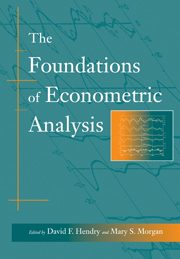Book contents
- Frontmatter
- Contents
- Preface
- Acknowledgements
- Introduction
- Bibliography
- I The Emerging Role of Econometrics in Economics
- II Early Time-Series Analysis
- III Applied Econometrics and the Identification Problem
- IV The Evolution of Statistical Thinking in Econometrics
- V Dynamic Models
- 27 Our Unstable Dollar and the So-Called Business Cycle (Journal of the American Statistical Association, vol. 20, 1925, pp. 181–91, 194–8)
- 28 The Notions of Horizon and Expectancy in Dynamic Economics (Econometrica, vol. 1, 1933, pp. 247–52, 259–64)
- 29 Propagation Problems and Impulse Problems in Dynamic Economics (in Economic Essays in Honour of Gustav Cassel, Allen & Unwin, London, 1933, pp. 171–3, 181–90, 197–203)
- 30 Statistical Testing of Business Cycle Theories: Business Cycles in the United States of America, 1919–1932 (League of Nations, Geneva, 1939, vol. II, pp. 13–20)
- 31 Statistical Estimation of Economic Relationships (read to the International Statistical Conferences, Washington, 1947. Proceedings published as a supplement to Econometrica, vol.17, 1949, pp. 6–9)
- 32 Prolegomena to a Pressure-Analysis of Economic Phenomena (Metroeconomica, vol. 1, 1949, pp. 135, 139–42)
- VI The Tinbergen Debate
- VII Structure and Simultaneity
- VIII The Probabilistic Revolution
- IX Exogeneity
- Index
28 - The Notions of Horizon and Expectancy in Dynamic Economics (Econometrica, vol. 1, 1933, pp. 247–52, 259–64)
Published online by Cambridge University Press: 05 June 2012
- Frontmatter
- Contents
- Preface
- Acknowledgements
- Introduction
- Bibliography
- I The Emerging Role of Econometrics in Economics
- II Early Time-Series Analysis
- III Applied Econometrics and the Identification Problem
- IV The Evolution of Statistical Thinking in Econometrics
- V Dynamic Models
- 27 Our Unstable Dollar and the So-Called Business Cycle (Journal of the American Statistical Association, vol. 20, 1925, pp. 181–91, 194–8)
- 28 The Notions of Horizon and Expectancy in Dynamic Economics (Econometrica, vol. 1, 1933, pp. 247–52, 259–64)
- 29 Propagation Problems and Impulse Problems in Dynamic Economics (in Economic Essays in Honour of Gustav Cassel, Allen & Unwin, London, 1933, pp. 171–3, 181–90, 197–203)
- 30 Statistical Testing of Business Cycle Theories: Business Cycles in the United States of America, 1919–1932 (League of Nations, Geneva, 1939, vol. II, pp. 13–20)
- 31 Statistical Estimation of Economic Relationships (read to the International Statistical Conferences, Washington, 1947. Proceedings published as a supplement to Econometrica, vol.17, 1949, pp. 6–9)
- 32 Prolegomena to a Pressure-Analysis of Economic Phenomena (Metroeconomica, vol. 1, 1949, pp. 135, 139–42)
- VI The Tinbergen Debate
- VII Structure and Simultaneity
- VIII The Probabilistic Revolution
- IX Exogeneity
- Index
Summary
In a theory of economic dynamics, the ophelimity function of individuals must be supposed to depend on the quantities of goods consumed and the sacrifices brought, not only at the moment considered, but also at later moments. Their offer and demand schemes for each moment then depend not only on the prices governing at that moment, but also on the price expectances the individuals have for the future. Among those expectances, those relating to the near future will be of more importance than those relating to a further period. As a first approximation it might be supposed that only the expectances relating to a certain time period (the ‘horizon’) are of importance, and all of the same importance. That means that the subject is at every moment t making a definite plan for the period from t to t + τ, and then realizes certain parts of that plan. Before other parts could be realized, the subject makes a ‘revision’ at the moment t + 1, say, for the period from t + 1 to t + τ + 1, etc.
The purpose of the present paper is to discuss, with the help of these notions, some results of statistical analysis, which cannot be explained by static theory, and which seem to teach something about horizons or expectances.
Relation between Total Annual Supply of Non-Perishable Crops and Amounts Handled
The amount handled is always smaller than the total supply (crop plus carry-over), the difference being the next year's carry-over.
- Type
- Chapter
- Information
- The Foundations of Econometric Analysis , pp. 322 - 332Publisher: Cambridge University PressPrint publication year: 1995

